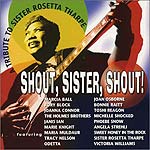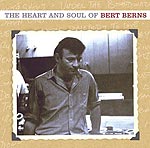
Celebrating the songwriters
|
This review first appeared in the Autumn 2003 issue of Turbula.
An interesting series of compilations has come out over the past nine months that, if unconnected by label or theme still presents an interesting overview of some generally overlooked portions of 20th century popular music.
From the shoutin' gospel of Sister Rosetta Tharpe to 1960s pop craftsman Bert Berns to a blues take on pop star Van Morrison's songs, these albums recapture some of the last century's musical brilliance.
Van Morrison is best-known as a first-rate Irish balladeer, albeit more attuned to rock sensibilities than Gaelic.
But he's also written some positively wonderful songs over the years – illustrated in a most interesting manner by a new collection from Evidence putting his music in the hands of blues singers.
Producer Jon Tiven (who earlier directed tributes to Don Covay, Otis Blackwell and Curtis Mayfield for Shanachie) has pulled together an unbelievable A list of top rank blues artists to caress Morrison's songbook. From William Bell ("Have I Told You Lately") to Little Milton ("Tupelo Honey"), Chuck Jackson ("Moondance") to Otis Clay ("Warm Love"), this collection shows how universal and complete Morrison's songs are.
And fellow songwriter Dan Penn ("Bright Side of the Road") and heavy bluesman Son Seals ("Queen of the Slipstream") change things up a bit from the velvety R&B of the above artists, yet stay in the groove.
Nobody does a tribute album like Tiven – this is as good as he's put together yet.
Sister Rosetta Tharpe was one of the first performers to popularize gospel music to a national black audience. In the 1930s, she was one of the top draws on the gospel circuit – and soon was drawing in fans as much for her performances as her testifying. She dabbled in crossover secular music, but never really made the jump – staying in the gospel fold for most of her professional life before leaving us in 1973.
And that's all great, but most of us purchase an album in order to be entertained, not educated. And the versions of songs Tharpe wrote or was known for performing here are for the most part singular, memorable and well worth checking out.
From Joan Osborne's opening cover of "Nobody's Fault but Mine," it's pretty clear that the musicians participating in this tribute were fully into the project. Odetta and Sweet Honey in the Rock provide a grounding in the gospel tradition that Tharpe herself never left, Michelle Shocked turns in a haunting version of "Strange Things Happening Every Day" and singer/guitarist Joanna Connor straddles blues and gospel with "Don't Take Everybody To Be Your Friend."
But the absolute highlights of this compilation have to be the five cuts with folk/rock singer Maria Muldaur involved. From her vocal-guitar gospel duet with Bonnie Raitt to her solo old-timey cover of "I Looked Down the Line (And I Wondered)" to her four-part harmonies with Marcia Ball, Tracy Nelson and Angela Strehli on "I Want a Tall Skinny Papa" and the Andrews Sisters-flavored "Shout Sister Shout," Muldaur's cuts contain all the joy and heartache of Tharpe's own performances.
If you think you've not heard of Bert Berns, you've certainly heard his work – from the Beatles' (and Isley Brothers') hit "Twist and Shout" to Janis Joplin's "Piece of My Heart," to "Hang on Sloopy" and "Everybody Needs Somebody to Love," Berns was one of the great unknown songwriters of the 1960s. Like Otis Blackwell and Doc Pomus, Berns provided much of the soundtrack to the '60s – but never got the kind of attention that the Leiber-Stoller songwriter team did.
Which isn't to knock Leiber-Stoller, but Berns was certainly their equal – and though he passed in 1967, his memory surely deserves the boost this excellent new compilation should provide.
Berns worked with a lot of soul and R&B artists as a producer and arranger as well as composer, and so it seems appropriate that the versions of some of his best-known songs are the original ones sung by those artists. So we get the Isleys' version of "Twist and Shout," not the Beatles'; Erma Franklin's reading of "Piece of My Heart," not Janis', Solomon Burke's "Everybody Neeeds Somebody to Love" (which the Blues Brothers later tore up quite nicely in their first movie).
What these versions show is why the more famous rock musicians later covered these songs – why Berns' songwriting so excited musicians.
Why his early death of a heart attack at age 38 was such a loss.


